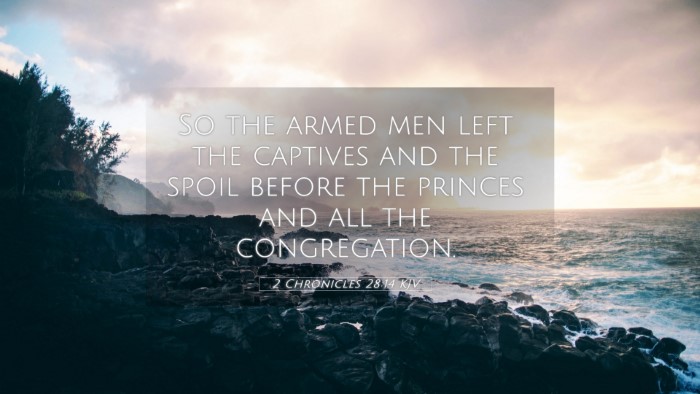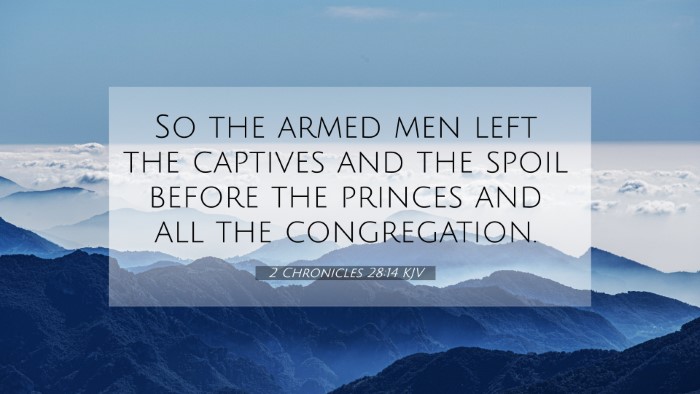Bible Verse Meaning and Interpretation: 2 Chronicles 28:14
The verse 2 Chronicles 28:14 states: "So the armed men left the captives and the spoil before the princes and all the congregation." This verse captures a pivotal moment during the reign of King Ahaz of Judah, highlighting themes of mercy, decision-making under duress, and inter-country relations.
Overview
This account occurs when the northern kingdom of Israel had successfully invaded Judah, capturing a significant number of prisoners. The context of this verse reveals the tension between warfare and morality, as the captives are left to be addressed by the Judean leaders.
Commentary Insights
-
Matthew Henry’s Commentary:
Henry emphasizes the importance of kindness amidst conflict. The decision to leave captives indicates a moment of grace, showcasing the leaders' acknowledgment of the greater good rather than the desire for revenge. This act symbolizes a strategic move that reflects humanity even in the harshness of war.
-
Albert Barnes’ Notes:
Barnes points out the symbolic nature of this event, suggesting that it portrays God’s mercy and a reflection of His favor. The leaders' actions can be seen as a statement against the treatment of prisoners and highlight the importance of ethical conduct during times of strife.
-
Adam Clarke’s Commentary:
Clarke discusses the social and religious implications of the event. By leaving the captives, the leaders are not only attempting to regain their dignity but are also enforcing a moral directive among their people. This action serves as a reminder of the responsibilities leaders hold during crisis moments.
Thematic Connections
This verse closely relates to several significant Biblical themes, including:
- Mercy and Compassion: The act of leaving captives behind signifies mercy, urging us to reflect on how we treat others in difficult situations.
- The Role of Leadership: The account demonstrates the moral obligations leaders have to act with justice and integrity.
- Restoration and Redemption: The verse serves as a precursor to future moments of restoration for Judah, portraying a hope for redemption amidst turmoil.
Cross References
Here are some key Bible verses that relate to 2 Chronicles 28:14 which illustrate its themes:
- Isaiah 1:17: "Learn to do well; seek judgment, relieve the oppressed, judge the fatherless, plead for the widow."
- Matthew 5:7: "Blessed are the merciful: for they shall obtain mercy."
- Luke 6:36: "Be ye therefore merciful, as your Father also is merciful."
- James 2:13: "For he shall have judgment without mercy, that hath shewed no mercy; and mercy rejoiceth against judgment."
- Proverbs 21:21: "He that followeth after righteousness and mercy findeth life, righteousness, and honour."
- Ephesians 6:9: "And, ye masters, do the same things unto them, forbearing threatening: knowing that your Master also is in heaven; neither is there respect of persons with him."
- Colossians 3:13: "Forbearing one another, and forgiving one another, if any man have a quarrel against any: even as Christ forgave you, so also do ye."
Practical Applications
Understanding 2 Chronicles 28:14 informs us about the nature of mercy, compassion, and the role of leadership in times of conflict. We can draw several practical applications:
- Practice mercy in our daily interactions, especially when dealing with adversities.
- Strive to uphold justice and ethical conduct in leadership positions.
- Promote restoration and reconciliation when conflicts arise, emulating the values depicted in the scripture.
Conclusion
2 Chronicles 28:14 invites readers to reflect on the themes of mercy and righteousness in the face of adversity. It encourages active consideration of how we, as individuals and leaders, can foster environments that promote compassion and justice. The connections and cross-references to other Bible verses serve to enrich our understanding of these important principles.


